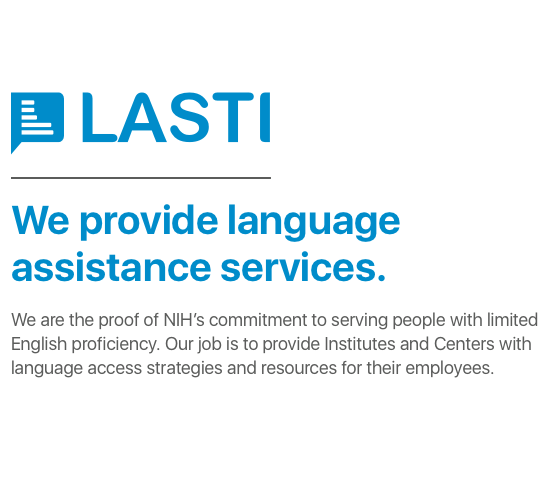Frequently Used Terms.
Limited English Proficient (LEP) Individual
Individuals who do not speak English as their primary language and who have a limited ability to read, speak, write, or understand English can be limited English proficient, or "LEP." These individuals may be entitled language assistance with respect to a particular type or service, benefit, or encounter.
Interpretation
The act of rendering spoken words from one language into another.
On-site Interpreting (OSI)
Interpreting done by an interpreter who is directly in the presence of the speakers. Also called face-to-face interpreting.
Remote Interpreting
Interpreting provided by an interpreter who is not in the presence of the speakers, e.g., interpreting via telephone or videoconferencing.
-
Types of Remote Interpreting
-
Telephone Interpreting
Interpreting carried out remotely, with the interpreter connected by telephone to the principal parties, typically provided through a speaker-phone or headsets.
-
Video Interpreting
Interpreting carried out remotely, using a video camera that enables an interpreter in a remote location to both see and hear the parties for whom he/she is interpreting via a TV monitor. The interpretation is relayed to the principal parties by speakerphone or through headsets. Two-way interactive television can also be used, so that the other parties can interact with the interpreter as if face-to- face.
-
-
Styles of Interpreting
-
Consecutive Interpreting
Oral translation of a speaker's words into another language when the speaker has finished speaking or pauses for interpreting. More formal than ad hoc interpreting and used, for example, in formal business meetings, for negotiations, training sessions or lectures.
-
Ad Hoc Interpreting
Spoken translation between two languages, in informal conversations, between two or more people. Used, for example, in business meetings, for phone calls, during site visits and social events. The term is sometimes used loosely to include consecutive interpreting.
-
Simultaneous Interpreting
In simultaneous interpretation, the interpreter delivers the message at the same time as the speaker. Simultaneous interpreters are used for large conferences, meetings, etc., where two or more languages are required. The interpreter usually sits in a booth and uses audio equipment.
-
Conference Interpreter
An interpreter with highly specialized skills, qualified for conferences, who provides simultaneous interpretation of a speaker’s words in one direction only from one language into another.
Translation
Is the process of transcribing words from one language to the other, after the source text is created.
Background Information
Information relating to the source text that helps the translator perform the translation in context using the correct style and tone. Examples include previously translated documents, terminology, and definitions.
Background Text
Text in the source and/or target language providing additional information about the subject matter of the text to be translated as well as the preferred terminology and written style.
Source Language
The original language of a document, web page or email before it is translated.
Target Language
The language into which the material is to be translated.
Localization
The process of adapting a product or software to a specific international language or culture so that it seems neutral to that particular region. True localization considers language, culture, customs and characteristics of the target locale. It frequently involves changes to software’s writing system and may change keyboard use, fonts, date, time and monetary format.
Voice-over
Spoken commentary in a film or multimedia presentation. Foreign-language voice-over consists of two parts: 1) translating the narrative, whereby timing (coordinating the voice with the film sequence) is an important consideration, and 2) recording the voice-over, which may be performed by a linguist with special training and/or expertise or by an actor. Voice-over services are provided by some translators and translation agencies / companies including Contextual Communications.


